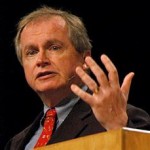 Bible scholar Don Carson writes:
Bible scholar Don Carson writes:
My father was a church planter in Québec, in the difficult years when there was strong opposition, some of it brutal. Baptist ministers alone spent a total of eight years in jail between 1950 and 1952. Dad’s congregations were not large; they were usually at the lower end of the two-digit range.
On Sunday mornings after the eleven o’clock service, Dad would often play the piano and call his three children to join him in singing, while Mum completed the preparations for dinner. But one Sunday morning in the late fifties, I recall, Dad was not at the piano, and was not to be found.
I finally tracked him down. The door of his study was ajar. I pushed it open, and there he was, kneeling in front of his big chair, praying and quietly weeping. This time I could hear what he was saying. He was interceding with God on behalf of the handful of people to whom he had preached, and in particular for the conversion of a few who regularly attended but who had never trusted Christ Jesus.
In the ranks of ecclesiastical hierarchies, my father is not a great man. He has never served a large church, never written a book, never discharged the duties of high denominational office. Doubtless his praying, too, embraces idioms and stylistic idiosyncrasies that should not be copied.
But with great gratitude to God, I testify that my parents were not hypocrites. That is the worst possible heritage to leave with children: high spiritual pretensions and low performance. My parents were the opposite: few pretensions, and disciplined performance.
What they prayed for were the important things, the things that congregate around the prayers of Scripture. And sometimes when I look at my own children, I wonder if, should the Lord give us another thirty years, they will remember their father as a man of prayer, or think of him as someone distant who was away from home rather a lot and who wrote a number of obscure books.
That quiet reflection often helps me to order my days.
Source: Don Carson, A Call to Spiritual Reformation: Priorities from Paul and His Prayers (Baker, 1992), page 26.
HT: TC

 Often times we will hear a preacher tell his audience to “open their heart” to the Lord. What strikes me about this phrase is that the only time I can find the concept of the opening of the heart mentioned in the New Testament, not man.
Often times we will hear a preacher tell his audience to “open their heart” to the Lord. What strikes me about this phrase is that the only time I can find the concept of the opening of the heart mentioned in the New Testament, not man. Chapter 19 of my new book “Twelve What Abouts…”
Chapter 19 of my new book “Twelve What Abouts…”